by Jenny Rose | Nov 25, 2023 | A Flourishing Woman, Body
In the last few months I have noticed a pattern as I teach private swim lessons.
It first caught my attention over the summer as I worked with a six-year-old in her home pool. She and I have worked together for some years. We have a good relationship built on trust and affection. She’s strong and big for her age, and she’s a tiger, assertive, competitive, stubborn, determined. She’s focused on progression through Red Cross Learn-to-Swim levels. She’s less interested in the skill-building than the card proclaiming her a Level ___ swimmer, and she wants the card now.

Photo by Chris Kristiansen on Unsplash
I started out her summer lessons the way I always do, with a review of the skills I knew she had already mastered. Then we began working on next-level skills. Except things fell apart. I began to feel frustrated. Her behavior, instead of sunny and eager (she was always waiting in the water for me until this), became oppositional. She stopped laughing with me. She stopped looking me in the eye. She stopped cooperating. She wouldn’t follow directions, she had to be coaxed into the water, and suddenly it wasn’t fun for either of us.
Her mom and I were puzzled. We agreed to take a couple of weeks off and regroup. My little student seemed relieved. During that time I thought about things and my student had some talks with her parents as we all tried to figure out what was wrong. Young children often lack the language to communicate their difficulties. Adults need to decode the behavior and provide the language.
I threw away my lesson plans for the next level and worked on games incorporating skills she already had. I made sure she knew our next lesson would be games. When I got to her house, she was able to tell me, with her mom’s support, that she didn’t want to learn some of the new skills I was presenting.
I suddenly recalled I was working with a six-year-old. Big, strong, determined, yes. But six years old! The level she and I had reached is typically a skill set nine to eleven-year-olds are working on.
Too much, too fast. Her competitiveness and determination had outstripped her physical and developmental ability, and in my delight in teaching and sharing my love for swimming, I simply forgot what was age-appropriate.
So, we spent the summer playing games and giggling. We practiced all the skills she already had, and we worked on some new ones, too, but she didn’t know that because they were games. If she didn’t like the game, we stopped immediately and did something else. She made up some games, too. We had a lot of fun. She waited in the water for me and pouted when our lessons ended. We were back in business.
I spoke privately with her mom and we agreed to slow down. This little girl needs time. Time to grow. Time to develop. Time to play and simply enjoy the water. Next summer she’ll be seven. If I work with her again, I’ll pay attention. She may be ready for next-level skills. She may not. But this time I’ll adjust more quickly, and she’ll have better language skills, too.
I have been observing this pattern during the autumn months as I teach. Sometimes kids want to learn more but we don’t have a lot more to teach them. Sometimes they want to learn more, or their parents want them to learn more, but they’re simply not ready physically or developmentally. An activity that used to be fun and easy starts to be stressful. Parents are frustrated. I’m not having fun. Children are uncooperative.
I’ve been thinking about time lately because in October I caught COVID for the first time and I’ve been sick ever since. I took good care of myself during COVID, in part because I was too sick to fight it. As I began to feel better, I slowly started exercising again. I didn’t want to slide backwards or develop a secondary infection. I was worried about weight loss and weakness, as well as my fatigue and lack of endurance. I gradually began walking to work again, and doing a mile at a time on the elliptical. I even got back in the pool and did an easy half a mile instead of my usual ¾ of a mile with intermittent sprinting.
I was just beginning to feel better when I got sick again. Not with COVID and not as sick, but I filled up with congestion and started to cough.

Photo by Travis Bozeman on Unsplash
So, it’s been doctor visits. More nasal swab testing. Masks at work. Shortened shifts. Teaching lessons from the deck rather than in the water. No gym. No swimming. No walking to work.
The doctor keeps saying rest. My friends keep saying rest. I am resting, I swear it! I don’t have a lot of choice. If I do housework for an hour I’m worn out. I can rest, but sleep has been hard to come by because when I lie down I start to cough and nothing really stops it. The nights have been hard. And haunted.
I’ve been dreaming about my mother, who died in August. Bad dreams, where she’s in trouble and I’m trying to rescue her. Often we’re in water, which is ridiculous because Mom hated the water. Often we’re in the dark, but I can hear her end-stage breathing and death rattle and I grope through the dream, trying to find her. Sometimes I find her and get my arms around her, but then I wake up. In fact, Mom hated to be touched and I never held her the way I do in my dreams. Only in her deep dementia would she tolerate touch. The dreams hurt me with their promise of loving contact that never happened and now never will happen. I doze in my recliner and wake up weeping.
I want to move, to be at work, to go out and rake leaves, to scrub the kitchen floor. Something. Anything. I trail into the kitchen, make another cup of tea, have another half cup of chicken soup, read a few pages, write a bit. I get in the car to go to work instead of walking (everyone at works frowns at me when they find out I walked), and I’m resentful. I want my life back. I want my strong, fit body back. I want my energy back. I want it back NOW.
And, clearly, I need time. I don’t want it … but I need it. I suppose it doesn’t much matter if my experience is post-COVID, or post-whatever-this-last-virus was or grief or trauma or just getting old (!). Whatever it is, I am not in charge, and my stubbornness and determination are presently more than my physical and perhaps emotional reality can live up to.
Time is enigmatic, isn’t it? We say time heals all wounds. Does it, or does it just give us a chance to process our wounds, to clean them out, breathe on them, bind them up and learn to live with them? How can I help myself? What am I supposed to be doing with all this unwanted time? I think of my little swimmer. She doesn’t need to do anything. She’s perfect. She simply needs to give herself some time to grow. That’s it. Time does the work. Our job is to allow it to do the work.
This is unsatisfying. I’ve read that rest is productive, which makes me mad. It cannot be true. I can’t remember ever feeling loved, valued, or wanted because I rested well. Quite the reverse. (On the other hand, when has unceasing production ever worked to buy love, value, or a sense of being wanted? Never.) I have a feeling Time doesn’t need me to do anything, at least not anything I’m not already doing. Another cup of tea. All the calories I can take in. Rest. Tears. Dreams. Writing. Reading and dozing on the couch with the cats.

Photo by Benjamin Combs on Unsplash
Time.
I worked two days Thanksgiving week before having five days off. My physical upper respiratory symptoms are certainly better. Normal sleep patterns are returning. Yet a dragging fatigue and bewildered feeling remain. “It’s detox,” my massage therapist says. “It’s transformation,” the wisest, deepest part of me says. “It’s rebirth,” my Tarot cards say.
It takes time. Everyone agrees on that one.
I remember my little swim student, outraged tears in her eyes. “I’m still a Level ___, right? You won’t take away my Level ___?”
“No, sweetie. You haven’t lost anything. It’s all still yours. You’re just not quite ready to go on to the next level. You need some time …”
I hugged her and gave her a kiss, told her I’d see her again next summer if she wanted lessons. She believed me, reluctantly. She’s in a dance class this winter. That will distract her, I hope.
Now I need to put my arms around myself. My life is not passing me by. I’ll exercise again. I’ll put the weight back on. I’ll get strong, sleep well, stop coughing.
I just need some more time.
Questions:
- Do you think rest is productive? In what way(s)?
- Do you think of time as an ally or an adversary?
- Do you think time actually heals, or does it just help us come to terms with what is?
- What does rest mean to you?
Leave a comment below!
To read my fiction, serially published free every week, go here: 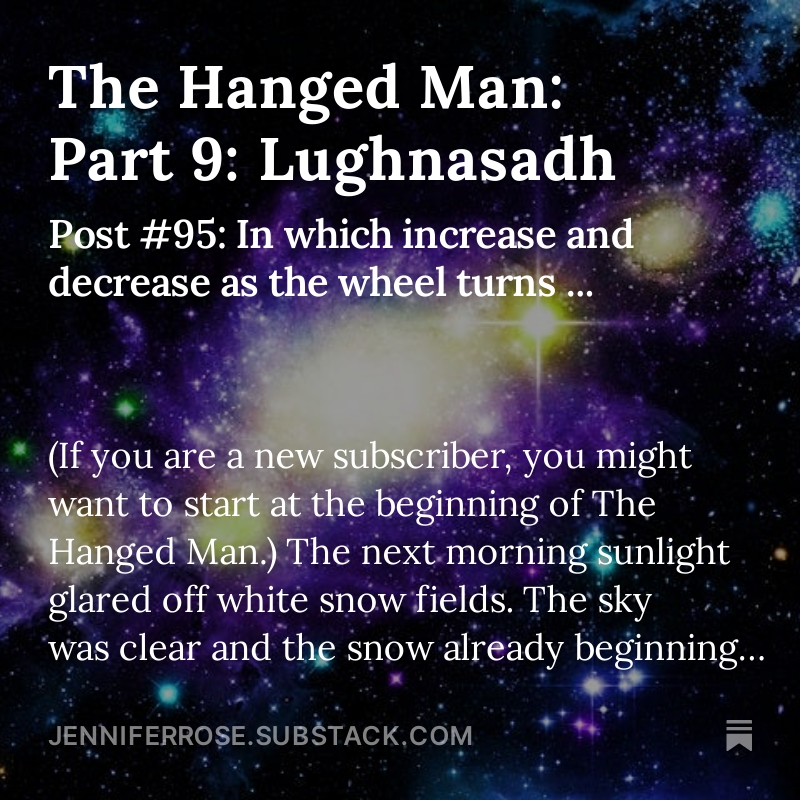
by Jenny Rose | Oct 21, 2023 | A Flourishing Woman, Body
I came down with COVID this week. It’s the first time I’ve had it, for which I’m thankful, as I’ve been diligent about vaccinations and I’m sure they are mitigating the virus. Three weeks ago I received the latest vaccination, in fact. (And no, I don’t think that’s why I got COVID!) 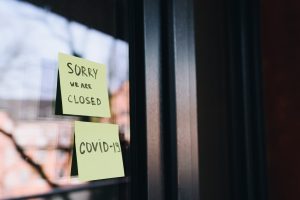
In our current world a positive COVID test is an iron-bound, all-purpose excuse for downing tools, stepping away, and spending some quiet time in solitude. So here I am, on the bench (or in my case, a comfy couch) instead of making my way through my usual work week and routines.
I haven’t been afraid of winding up in the hospital on a ventilator. I’m not especially high risk and in very good health. I’ve been resigned, more than anything else. Resigned that I unknowingly exposed my friends and coworkers before I knew what was happening. Resigned that this is a different viral experience than I’ve ever had before. Resigned that someone else taught my group swimming lessons and enjoyed the kids. Resigned to the fact that now we all have to mask for a time at work.
I’ve been miserable with fever, aches, congestion, and difficulty breathing. The physical symptoms are easing; however, I have entirely lost both taste and smell, perhaps the most distressing symptom of all, in part because it’s so different. Yesterday I ventured out for a walk.
It was breezy and grey with rain moving in, the air warm and soft. I took a short neighborhood walk, enjoying being outside and moving, but struggling with shortness of breath, disoriented by my inability to smell the rain coming and the crisping leaves. I feel cut off from my greatest source of solace, the natural world. I will continue to walk every day because my body needs it, but my joy in being outside is painfully diminished.
When I completed my test route, I felt too tired to do more. I came home and discovered I’d been gone less than 10 minutes.
At times like this I bless my passion for reading. I’ve had eye inflammation and itching with this virus; a symptom I’ve never had before. It worsens as my fever increases and makes looking at a screen or watching TV miserable, as well as sitting in any kind of sunlight. However, I can turn on a lamp and read until I doze, then wake and read some more. This passes the time, keeps me quiet, and distracts me from my present experience.
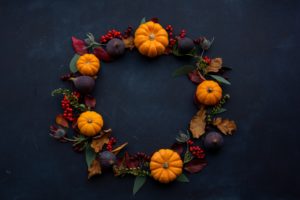
Photo by Joanna Kosinska on Unsplash
This morning I walked again in a light rain. It’s been a dull-colored fall here. Some leaves are finally starting to turn; other trees are mostly bare already. This time I was ready for scent blindness. I turned away from what I couldn’t do and feasted my eyes on the rich colors of fall-blooming flowers and the leaves. A humid breeze fanned my cheek. I focused on breathing, filling my weary lungs with the fresh, damp air, exhaling as well as I could through my nose. I paid attention to what I heard: crows squabbling, an occasional passing car, a barking dog, the subtle background sound of the rain. I walked a longer distance than yesterday.
I haven’t run a fever from more than 24 hours and my throat feels normal again. Progress, although my heart thumps uncomfortably when I’m up and doing things and I have the lingering feeling I’m not getting quite enough air. Still, symptoms are clearly abating.
Benches are not comfortable, for the most part. No back support. Hard under the ass. Sitting on the sidelines watching others live their lives when we can’t participate much in ours is discouraging. So much of my daily centering, comfort, and self-care are bound up with scent. I could not have anticipated how devastated I feel without the simple ability to smell and taste. My scented fall candles, usually a daily pleasure, sit unlit. Tea might as well be plain hot water. Food is absolutely tasteless. I can’t smell when the cat boxes need to be emptied. Cleaning doesn’t smell like cleaning. Fresh air doesn’t smell fresh. Taking a shower, using soap and lotion and putting on clean clothes, is joyless. Eating is a chore.
Yet still there is reading, and writing. I’m washing my sheets. I’ve aired out my room and waved a smudge stick around. I’ve washed the breakfast dishes. The cats are snuggled up with me in my chair. The rain comes down. Another cup of tea cools at my elbow. I picked up a scarlet leaf while I was out walking; an antidote to depression.
In spite of violence, pain, suffering, and illness, the world is beautiful. It welcomes us, shelters us, sustains us. Small pleasures and joys are everywhere, if we only engage with them. Refusing pleasure and peace does not help those who have none. Whatever our circumstance, we are all connected.
Questions:
- How would your life change if you couldn’t smell anything?
- If you had no ability to taste, how might it change your relationship to food?
- In these dark days of twisted politics and violence, what gives you hope?
- What is your favorite indulgence or ritual when you’re sick?
Leave a comment below!
To read my fiction, serially published free every week, go here: 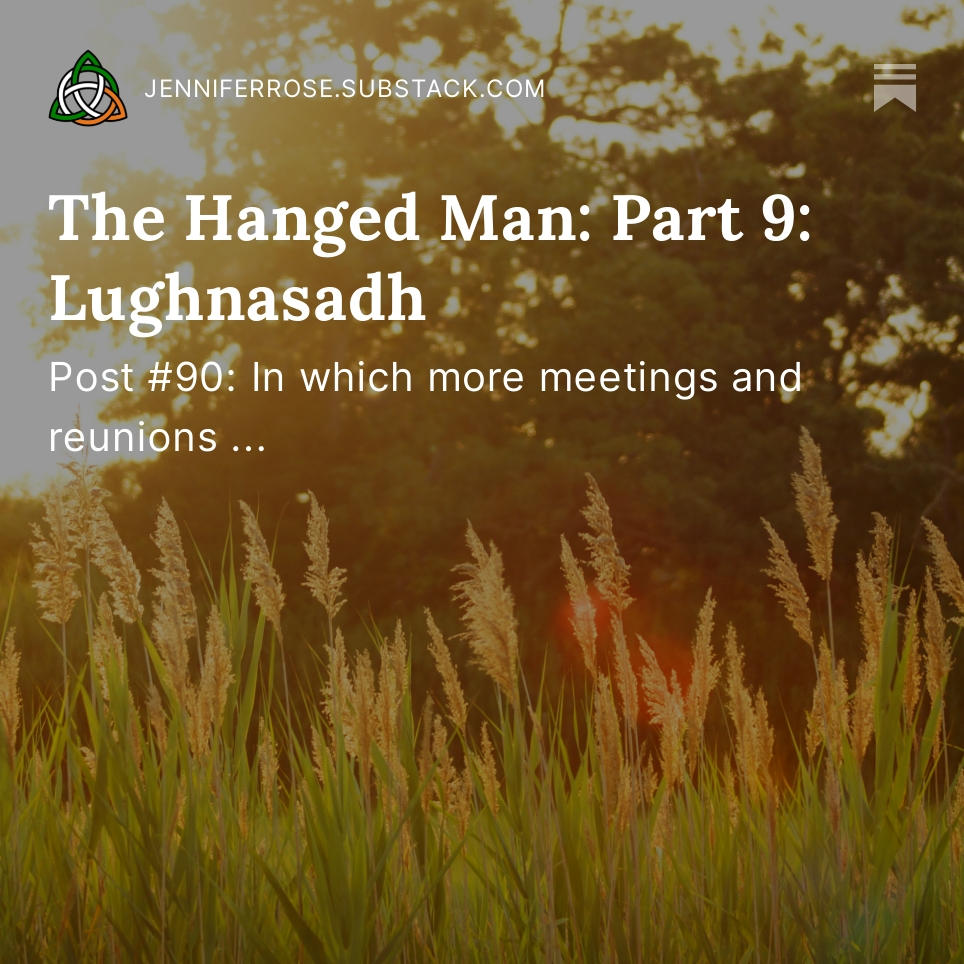
by Jenny Rose | Oct 7, 2023 | A Flourishing Woman, The Journey
This post grew out of two seeds. The first was a piece by a substacker I follow who heard a phrase on a podcast about pleasure in discipline. It struck her that she’s good at finding pleasure in discipline (think productivity), not so good at being disciplined about pleasure.
This struck me, too. I’m quite disciplined when it comes to achieving goals and being productive, but it never occurs to me to apply that same discipline to pleasure. What a thought! How lazy. How irresponsible …
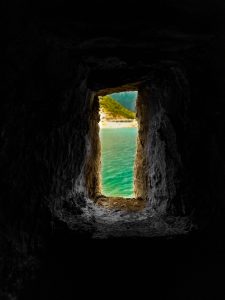
By Veljo Milic on Unsplash
Amused at my internal horror, I played with this idea for a day or two. Discipline is like a doorway, I mused. One can walk through it and into pleasure. Being a strong adherent of Work Before Pleasure (even though I know the work never ends), the doorway metaphor seemed appropriate. For a minute. Until I realized standing in the doorway of discipline, unable to move forward into pleasure, is no good, either. And that’s mostly what I do.
Sigh.
Then, I did my Mabon Tarot spread. I do this at every turn of the wheel. Mabon is Fall Equinox. It came and went while I was wading through paperwork, documents, emails, insurance, retirement investments, and the business of changing banks, cards, automatic payments, and transfer networks.
Did I mention paperwork?
Anyway, I did eventually get to pulling cards about a week after Mabon. The last card of the spread, the “overall outcome” card, happened to be the 9 of Stones (my deck), or the 9 of Pentacles (classic deck). In my deck, this card is the card of tradition, signifying reverence for past wisdom and sacrifice, and ancestral memory.
It stopped me in my tracks. Ever since my mother died in August (hence the endless paperwork), I’ve been preoccupied with family, past and present, living and dead, known and (mostly) unknown. Managing my inheritance has been fraught with guilt, shame, anguished memories, bewildered pain.
I don’t feel reverence. Whatever I feel, it’s not that. (Another thing to feel guilty about.) Whatever happened in my past context of family, I’ve found no wisdom in it. Plenty of sacrifice, though, mostly of and by me.
In the five days since I turned this card over, I’ve been thinking about it. It’s the traditional time of year for many cultures to remember ancestors, the time when the veil between the worlds grows thin, the time when the trees release their leaves to decay and sleep before the next season of growth.
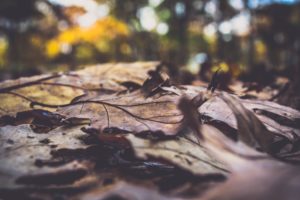
Photo by fancycrave on Unsplash
The discipline of pleasure. And the pleasure of discipline.
Reverence for past wisdom and sacrifice; ancestral memory.
I suddenly remembered an old story I used to tell during this time of year, “The Corpse Bride.” It’s a story out of Jewish tradition. A corpse bride, still wearing her wedding finery, mourns her violent death as she was on her way to her wedding. She grieves for her lost opportunities. A living bride comforts her, vowing to fully experience all that the corpse bride dreamed of and lost. The corpse bride is then able to lie back in her grave and rest in peace.
These pieces seemed to answer a question I haven’t consciously asked. Discipline. Pleasure. Unquiet ancestors. Lost opportunities.
How do we connect with our ancestors in a healthy way? We’re only just beginning to understand epigenetics and the ways in which we’re linked to the generations who came before us. I know something about my DNA, but almost nothing about ancestors. When I think of ancestors, I think of a dignified group of people, wise, healthy, connected, at peace. When I think of my family, I think of rejection, dysfunction, and abandonment. I hardly knew my family, even the ones living during my lifetime. What I mostly knew was I didn’t belong, though I was a biological child of the people I called Mom and Dad.
I feel no connection to ancestors. My unconscious assumption is they wouldn’t want me any more than the family I knew did.
However. The fact is I do have blood ties and a biological family tree, as we all do. I have inherited certain characteristics, behaviors, weaknesses, strengths, and wounds through epigenetics as well as genetics and environmental factors. I am now a twig at the end of a branch on the family tree. Neither of my sons have children. I have no daughter. My two cousins are also childless, as is my brother. I am the last female in the last generation of my direct maternal line.
Me. The highly sensitive, passionate, sensual, creative, noncompliant one nobody wanted!
I dealt several Tarot cards of healing and recovery in that Mabon spread. Perhaps they’re not solely about my healing. In conjunction with the season and this powerful card of ancestry, perhaps I have an opportunity to heal myself and comfort? give peace to? palliate? propitiate? the women who came before me, the women who gave me life.
Whatever came before, I’m here now. I breathe. My heart beats. Half the family resources are in my hands. I have the power to make choices. I choose to continue forward into generosity, healing, and joy. I don’t have ancestral traditions or maps. No one ever gave me a map, because they didn’t know the way themselves. Maybe they didn’t want to go in that direction; maybe they stopped looking for the path. It doesn’t matter now.
What matters now is to live … because they can’t. Like the corpse bride, their earthly opportunities are lost. Maybe from the very beginning I was the one with the potential to bring my female ancestors peace at last, not because I complied with their oppression, but because I refused it. Maybe it’s my wisdom that’s needed, the map in my pocket we all must follow.
The women of my family taught me some of the pleasures of discipline. Perhaps I must teach them about the discipline of pleasure, of joy. Which means I must learn it myself first.
I swam yesterday. I’m required to train weekly for my lifeguard position, but that’s only a good excuse. I swim for pure pleasure. I relished every sensual detail, every rhythmic breath, every stretch and flex of my muscles, the silk of the water. I relished the hot shower afterwards, the long drink of water I took, my clean hair and warm and relaxed body. Because they never did, even when alive. Because they never can.
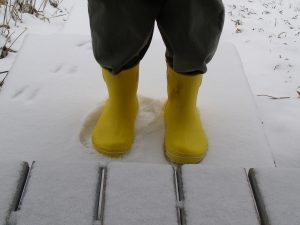
Yellow Boots
This Saturday morning I ran to the store. I took a deep lungful of the grey, humid air, heavy with the promise of coming rain. I savored it. I chatted with the cashier. I bought myself a luxurious dark chocolate bar. I deliberately splashed through a puddle in the parking lot with my bright yellow duckie boots. I smiled at strangers. I drove home with the window open and the damp air stirring my hair. Because they never did these things. (Well, maybe the chocolate. Mom did like chocolate.) Because now they never can.
I sit here on my couch with the cats, the laptop on my lap. I’m burning a scented candle, surrounded by a couple of sleeveless summer shirts I just bought on sale, my journal, lists, notes, the mail. I’m at peace. I don’t have pain. (Mom always had pain.) I’m content. I have friends I love and who love me. Life is good, filled with projects and plans. In a few minutes I’ll get up, put some laundry in, wash the dishes, stand in the doorway and look at the sky, feel the air stirring as the storm approaches. I won’t do these things because I’m disciplined and productive, or because I must, but because I can. I want to. I choose to. These are the small tasks of my life, and I love my life.
All these I’ll do for myself, and also for them, my ancestors, the women who came before me, my blood, my bone, the wombs who gave me life. Because they can’t.
They’re gone. (May they rest in peace.)
But I’m still here.
Questions:
- What does the word ‘ancestor’ mean to you? Do you connect it with a real person in your life?
- Are you prepared to be an ancestor? What wisdom would you pass on to younger generations?
- Do you feel connected to the generations of family before you?
- Would you like to be more deeply connected to living family members? What’s in your way?
Leave a comment below!
To read my fiction, serially published free every week, go here: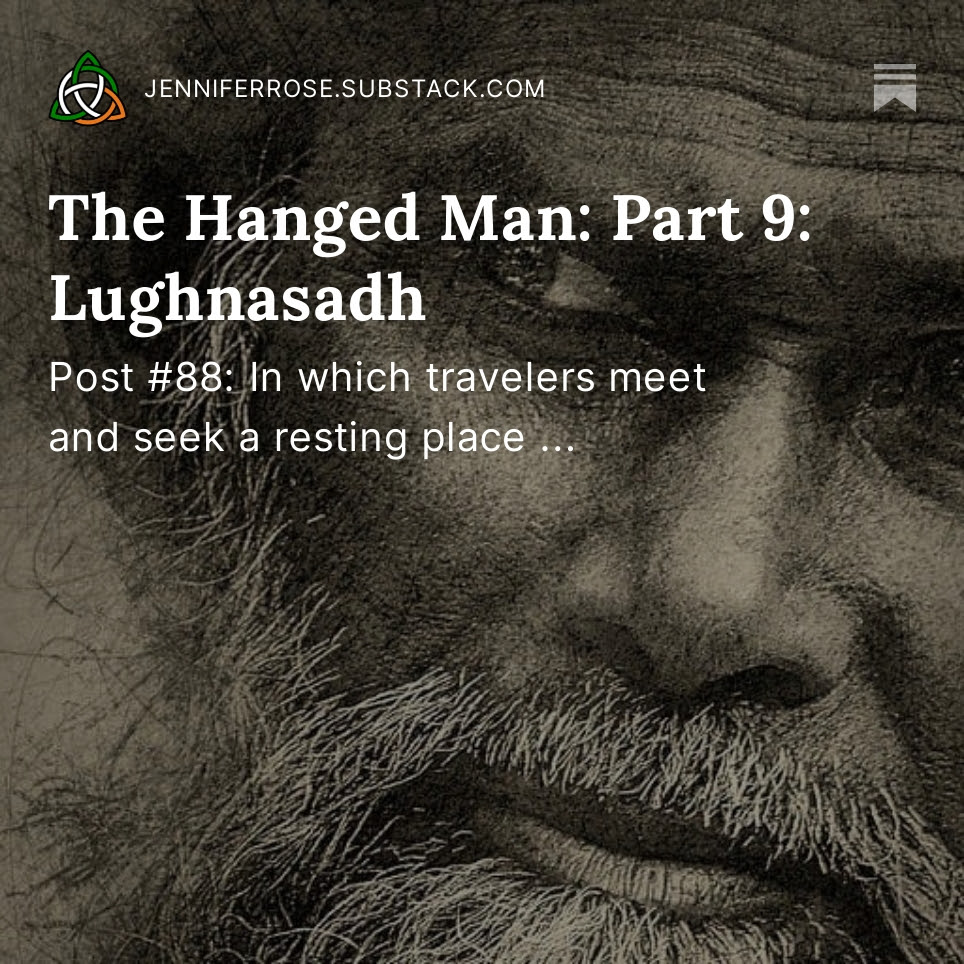
by Jenny Rose | Jun 24, 2023 | Connection & Community, Emotional Intelligence
My work team and I provide services to patients and the public in our aquatic rehab facility in Central Maine, which means it’s impossible for me to live in a bubble. Thank goodness.
I’ve been complimented, praised, flirted with, yelled at, accused, and blamed. I’ve listened to a wide range of political and religious viewpoints with a polite face on. I’ve dealt with tears and tantrums (not talking only about the kids here). I’ve heard about medical and family history in excruciating detail, often repeatedly. I’ve watched patrons and patients get better, and I’ve watched them get worse. I’ve watched them lose weight and gain weight. I’ve met grandchildren and siblings when they visit Maine. I interact with people who are confused, struggle with memory loss, or are affected by dementia, either their own or a loved one’s.
I’ve seen a variety of sexual identities, gender presentations, and body dysmorphia (and no, I’m not conflating body dysmorphia with homosexuality.) My team has served patrons who are listed on our state sex offender registry.
We serve deaf patrons, autistic patrons, anxious patrons, mentally ill patrons, special needs patrons of all kinds and ages. We serve an occasional minor who gets dumped in our emergency room and lives there for a time while the authorities try to find placement.
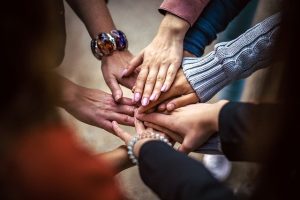
Image by Bob Dmyt from Pixabay
People. All kinds of people. All colors, shapes, ages, and sizes. All different.
People just like me.
I notice a thing in the present cultural discourse. People who browbeat others about inclusion and tolerance invariably are the least inclusive and tolerant.
Talk (and typing) is cheaper every day.
As a writer and lover of words, I notice a deluge of new terminology and labels, many of which strike me as ridiculous, redundant, and/or meaningless. Their sole purpose appears to be to increase the ways we can despise and exclude one another. At the same time, there’s an ominous drumbeat in the background about ideas and words some person might find offensive and therefore must be forcibly eradicated. A few months ago one of my adult sons said to me, “Mom, you can’t use the word science in public,” as though explaining socially acceptable language to a child. All I could do was look at him in disbelief.
Science is not a dirty word. Disagreement is not hate, and respect and tolerance do not equal agreement. Asking questions is not a call to arms.
The Word Police are out in force, trolling online and hijacking us in public places. Virtue signaling has begun to take the place of authentic discourse. We’re harshly and instantly judged and labeled by the language we use and the ideas we express.
Toni Morrison said, “Definitions belong to the definers, not the defined.” I think about that every day. Another phrase frequently in my mind is “I’m okay with your disapproval of me.” People have been disapproving of me since the day I was born. I’m used to it. The sky hasn’t fallen yet and somehow I manage to continue to exist.
I’m not the slightest bit interested in disapproval, labels, or sweeping generalizations, which are increasingly idiotic as labels proliferate.
I’ve been reading lately about the “tribe of one,” the logical endpoint to the cultural mandate to divide ourselves into ever-decreasing groups until we’re each completely isolated, believing no one can possibly understand our particular experience as a self-defined ______, _____, etc. Therefore, the world is against us, we’re marginalized and oppressed victims, and we’re owed power, respect, and tolerance no matter how egregious our behavior is. No one is included in our little bubble. Everyone is excluded. Yet we expect and demand inclusion, which is to say, accommodation.
Who benefits from this solipsistic isolation? Is this the kind of human experience we want for ourselves, for our children? Is this social justice?
There are other paths to take. We could focus on our similarities, on the common human experiences binding us all together. We could build a new lexicon of connection rather than division. We could stop using labels, even in the privacy of our own heads. We could value curiosity more highly than outrage, confidence more than a constant state of offense. We could value authentic expression more than virtue signaling.
We seem to have forgotten the real world is not a set of disconnected bubbles. An infinite number of labels (including pronouns) cannot describe the entirety of a human being. Experiences define human beings. Birth. Death. Connection. Feelings. Living in a body. These bind us together. The life we are living defines us, not labels.
Every single one of us in this moment is included in the human family. We all have that in common. Why are we so determined to slash that root into pieces? I ask again, who benefits from this brutal severing? Why are we participating in it? How have intelligent, well-meaning, compassionate people become machete-wielding destroyers, all the while mouthing words like ‘inclusion’ and debating pronouns?
At work (and elsewhere), I’m focused on people. Of course I notice skin color, sometimes eye color, hair, body type, spoken language, cognitive and physical ability. I also notice tattoos, scars, stretch marks, skin tags, moles, and the occasional blood-bloated tick! Swimming suits are revealing clothing. None of these details define anyone, however. For me, they’re value neutral. I don’t connect or disconnect because of someone’s appearance. I can’t make valid generalizations about anyone based on the way they look. We treat everyone who comes in the door with the same respect; our expectations in terms of adhering to our safety rules are the same for everyone. We accommodate differing physical abilities and needs without fuss.
Wheelchairs, walkers, prostheses, oxygen, health status and injury are details, not definitions.
Now and then I interact with someone I hardly know who makes it plain they disapprove of something I said, or wrote, or chose. They were triggered. They were outraged. They were offended. I’m met with a curled lip, judgement, and criticism. I’m made to understand I’m hateful and bigoted, which I don’t take too seriously, as I’m neither. Anyone who knows me at all knows that.

By Landsil on Unsplash
In short, I’m immediately excluded, and there is no court of appeals. There’s no mutual bridge-building. Because of a word or an expressed point of view I’m entirely rejected, now and forevermore. Most of the time I consider the source and shrug off this kind of interaction. In certain circumstances, however, it’s destructive and hurtful in a more personal way. We can’t always choose the people in our lives. I can’t build connections alone.
Situations like this invariably catch me off guard. When someone expresses a view or belief I disagree with, I simply step around it. I change the subject, probing for connection points. I don’t concentrate on our differences or potential disagreements. I don’t expect others to fall in line with my beliefs. I don’t shame or shun others because they have a different point of view. I don’t think of myself as being on higher moral ground, and when others come at me with moral indignation, it makes me smile inwardly. Good grief! Get over yourself already.
I’m willing to include you. Will you include me? I ‘ll give you tolerance and respect. Will you give them to me? I’ll give you the benefit of the doubt. Will you give it to me?
I’d rather be curious than outraged. I’d rather have confidence in myself and my experience than maintain a hair trigger on my sense of offence. Most people don’t mean to be offensive. If they do, it’s best to ignore it. Life is too short to spend my days in a constant state of outrage and offense. It doesn’t change anything and nobody cares. Cultivating a sense of humor is more fun.
We’re not entitled to have our triggers, sensitivities, and ideology accommodated.
If we’re all especially vulnerable, broken, or traumatized, none of us are. If we’re all oppressed victims, none of us are. If we’re all vile haters and bigots, none of us are.
What we all are is … human beings. As human beings, not a single soul is excluded. Isn’t it enough to simply be the best human beings we can be and allow those around us to do the same?
Questions:
- When you think of a person in your life, do you think of a list of labels or do you think of a human being? Once someone is labeled, do you ever feel you’ve mislabeled, misunderstood, or misjudged them? If so, do you admit it and eradicate the label?
- Can you describe someone you know without using a single label? Try it!
- In the first five minutes of contact with a stranger, are you seeking to build connection or mentally applying labels to them? Which labels do you check for first?
- Do you turn away from anyone who disagrees with or questions your particular ideology or belief system? Do you view such people as hateful? Is it possible to disagree with you or question you and still be a good person?
Leave a comment below!
To read my fiction, serially published free every week, go here: 
by Jenny Rose | May 13, 2023 | Authenticity, Emotional Intelligence
I have written about dance here before. In the structure I use, the 5 Rhythms Wave by Gabrielle Roth, chaos is part of the wave. The music for chaos is fast but grounded. Think Pink Floyd’s Meddle.
As I lingered on the threshold between waking and sleep this morning, thinking about loss, the subject of my last post; thinking about my distressing inability to publish my usual essay on Substack last week, and thinking about the ways in which I’m reshaping my beliefs about my family and therefore myself, I recognized the chaos part of the dance.

Photo by Leon Liu on Unsplash
To dance in chaos involves letting everything go except the beat. Chaos is about strength, not beauty. It’s about grounding and staying grounded even as the music flings us through space.
Chaos is the part where you dance till you drool.
The edge of chaos is fertile, regenerative, thick with possibility. It’s also powerfully disorganized and unpredictable. It’s exhausting, overwhelming. Too much is happening too fast. When dancing chaos, we give ourselves entirely to the music and follow it through the tumult however we can. As Margaret Shepherd said, “Sometimes your only available transportation is a leap of faith.” Add music to that idea and you have the chaos part of the dance. The car has broken down. The planes are grounded. The train has derailed. The illusion we’re in control has shattered. Our routines and schedules fall apart around us. Our internal and external worlds begin to reshape in ways we can’t understand.
I’ve been troubled in the last couple of weeks by the violence of my rebellion against doing anything except work and play in the garden. I don’t want to write. I don’t want to think or reason. I don’t care about the damn housework. Beltane, May 1st, came and went without my usual ritual and practices. I don’t want to be brave, strong, organized, compassionate, tolerant, empathetic, or responsible.
I can’t remember a time in my life when I’ve shut down like this. I’m unable to guilt or lash myself into being “productive.” I feel ashamed and scared. I don’t recognize myself.
It occurs to me this is my Beltane ritual this year. After all, Beltane is about fertility. Physical fertility, the cyclical fertility of the growing season, creative fertility. My ritual this year is being in the garden. There, with my knees in the dirt, the smell and feel of the soil, the texture of new weeds and old leaves and matted grass (we didn’t have a mower last year), I am peaceful. I know where I am. I am, literally, grounded. I don’t have my phone. Nobody needs anything from me. I bend, kneel, stoop, dig, rake and shovel compost mindlessly. I dream vaguely about new garden beds, rewilding with native shrubs and trees. Black flies come for their drop of blood. The sun shines down on me.
Right now I need to be in the garden. I don’t understand it entirely, but perhaps there’s no need to. What I do know is something in me refuses to engage with anything else. As the lilies and iris emerge, as the tulips bloom and the daffodils fade, as the lilacs bud and the magnolia blossoms fall and cover the ground, I mulch and prune and feel seismic forces beyond my control reshape me internally.

Photo by Kelly Sikkema on Unsplash
So much of what I’ve learned and believed about my family and my place in it has crumbled into dust. Old family myths have exploded with fragments of evidence from Mom’s life, unearthed in the process of selling her estate. I didn’t entirely believe in some of those myths, but they were stable. They provided a family background I was familiar with. I built an identity from the identities family members who came before me created. If I am not the despised one, the broken one, the one who doesn’t belong, the cuckoo in the nest, who am I? Has all that been yet another family myth? Has any of it ever been about who I really am or my personal value, or have I been nothing but a faceless, nameless piece in a dysfunctional family pattern?
I long for freedom. Is this the beginning of freedom?
My recent inability to force myself to take care of business, to be responsible, consistent, and productive, is terrifying. I’ve always pushed myself through any resistance or fatigue. I’ve always known I must justify my existence with constant production, pleasing, and caregiving.
Am I free of that now? If I don’t have to justify my existence because that belief is a lie based on family mythology that’s at least part lies, is that freedom? Am I brave enough to take my freedom, walk away from all the burdens (too heavy for me, but I’ve carried them anyway), and simply choose what makes me happy? I have stood at this crossroad before.
Two weeks ago I wrote about loss. Now I’m watching glimmers of new beginnings, nebulous glints of what might come into the disturbed ground of my being. I pick up trash and find rich soil beneath it. I dig up dandelions and burdocks and discover little patches of old garden. The sun touches me without asking for anything in return. I rake away last year’s debris and mix it with compost to build new garden beds. This morning, the crab apple is in bloom. The tight buds on the white lilac by the porch door gather perfume.
Meanwhile, back in Colorado, strangers live in my mother’s house. Hospice tells me Mom can no longer ambulate independently, even with her walker. A call in the middle of last night reported yet another fall, as she doesn’t realize (or won’t admit) her own weakness. Appraisal revealed my wealthy and powerful grandmother’s gold, pearls, and gemstones were mostly costume, not real. A ladylike façade. A denial of her impoverished roots. A glimpse of shame and fear that rival my own, though I never knew they were there.
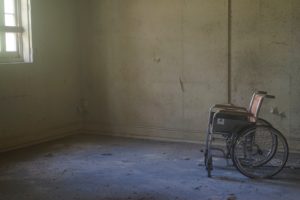
Photo by Doug Maloney on Unsplash
It’s Mother’s Day weekend. A friend asked me yesterday how I felt about that, and I had no words.
What is real? What can I bear? The dirt on my knees, under my fingernails. The spectacularly itchy, burning welts of black fly bites. The egg shells, banana peels, and soggy segments of lemon in the compost pile. The lovely cupped double tulips I planted last fall, white, pink and purple. The thumb-sized bumble bee tumbling ecstatically among the pink blossoms of the crabapple. My own breath, heartbeat, sweat. The sun on my skin.
Gardens are made and remade. They die and are reborn. They go wild and survive until rediscovered. They adjust, adapt, take advantage of the edge of chaos according to their own wisdom and purpose.
For now, I’m in the garden, dancing with chaos, nurturing new life, hanging on.
Questions:
- What is your experience of Mother’s Day?
- In the times during which you struggle to manage your life, are you fearful or do you allow yourself to follow your needs?
- Do you find chaos joyful and exhilarating or frightening?
- What opportunities have you had to reframe your family?
Leave a comment below!
To read my fiction, serially published free every week, go here: 

















